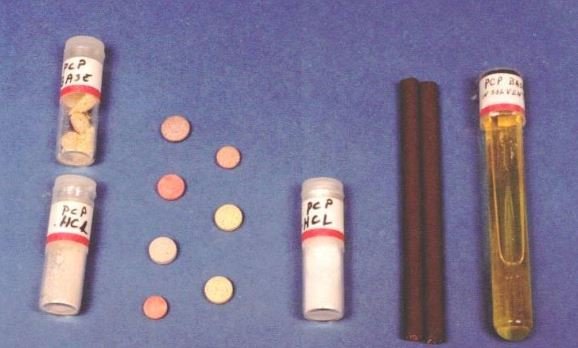How Long Does PCP Stay in your System?
Introduction
PCP is a hallucinogenic drug that is originally used as tranquilizer for humans and animals. There are several variables that needs to be considered in identifying the length of time PCP stays in the system [1, 2].
What is PCP?
PCP or Phencyclidine was first developed in the 1950’s as a FDA-approved anesthesia. It was removed from the market 15 years later because of its extended half-life and adverse effects.
Despite of this, it has been a popular recreational drug during the late 60’s and 70’s. PCP is usually available in capsule, tablet and colored powder form [1, 2, 3].

Figure 1 shows the different forms of PCP.
Other Names
PCP is also known in the market as: Angel dust, embalming fluid, love boat, hog, super grass, killer weed, rocket fuel, ozone and wack [2].
Pharmacological Effects
PCP is an example of arylcyclohexamines and is absorbed rapidly in the lungs. It can easily cross the blood-brain barrier and it antagonizes some neurotransmitter receptors. Symptoms will appear when the blood concentration is between 4 ng/ml to 100 ng/ml.
The changes in the behaviour may be barely noticeable at the lower end of the range but may cause comatose when the concentration reaches 100 ng/ml [1, 2, 4].
Examples of symptoms that may be present in an individual taking PCP may include nystagmus (rapid and involuntary movements of the eyes), breath that smells like solvent or ether, hallucinations, increased strength, excited delirium, time distortions, catatonic rigidity and inability to remember events while under the effect of the drug. Aside from these symptoms, ingestion of PCP causes death of brain cells [1, 3].
Drug Tests Timetable
Since PCP is a fat soluble drug, it is stored in the brain and body’s fat deposits following the ingestion of the drug. This is an estimate range of times PCP may be detected through different testing methods [1, 3].
- Blood Test: 24 hours
- Urine Test:1-7 days, heavy use: 1-4 weeks
- Saliva Test: 1-10 days
- Hair Follicle Test: up to 90 days
Factors That Affect How Long PCP Stay in the Body
Age
Younger people have faster metabolism and can remove PCP from the body faster. An older person who uses this drug may not be able to metabolize the drug just as fast probably because of slower metabolism and relatively more inefficient liver [3].
Food Intake
An individual who takes the drug on a full stomach will not be able to absorb as much drug as he can on a full stomach [3].
Function of liver and kidney
Impaired renal and hepatic function affects the clearance of PCP from the system. Individuals with these conditions may take a longer time to clear the drug [3].
Dosage and purity of the drug
The higher the dosage that the individual ingest, the longer time it will take to clear the drug. PCP can be difficult to synthesize and there re products in the market may contain precursors or other chemical byproducts. Because of this, the rate of absorption and excretion of the drug may be affected [3].
References
- Toxicology Laboratories. (2015). Detection Of Phencyclidine (PCP) In Urine: Detection Of Phencyclidine (PCP) In Urine. Retrieved from Healthy: http://www.healthy.net/Health/Article/Detection_of_Phencyclidine_PCP_in_Urine/8091
- T, B. (2015, July 31). How Long Does PCP Stay in Your System? Retrieved from Very Well: https://www.verywell.com/how-long-does-pcp-stay-in-your-system-80301
- Mental Health Blog. (2015, October 15). How Long Does PCP Stay In Your System? (Phencyclidine). Retrieved from Mental Health Daily: http://mentalhealthdaily.com/2015/10/15/how-long-does-pcp-stay-in-your-system-phencyclidine/
- Beagle, J. (n.d.). Synthesis and Effects of PCP Analogs. Retrieved from Erowid: https://www.erowid.org/archive/rhodium/chemistry/pcp/pcp_index.html
